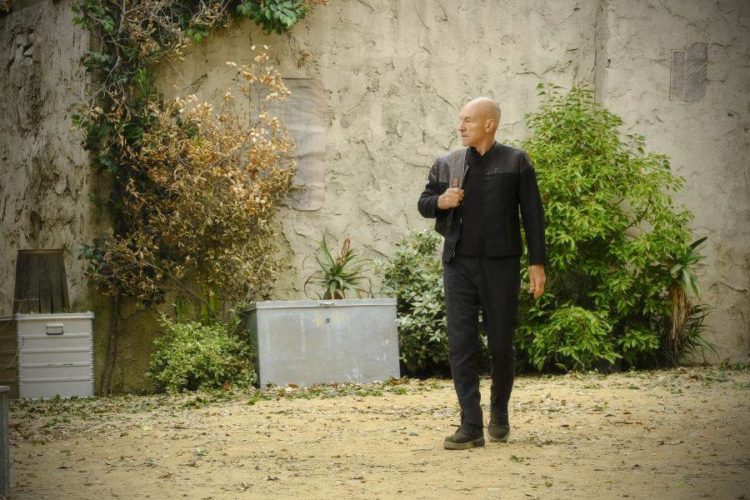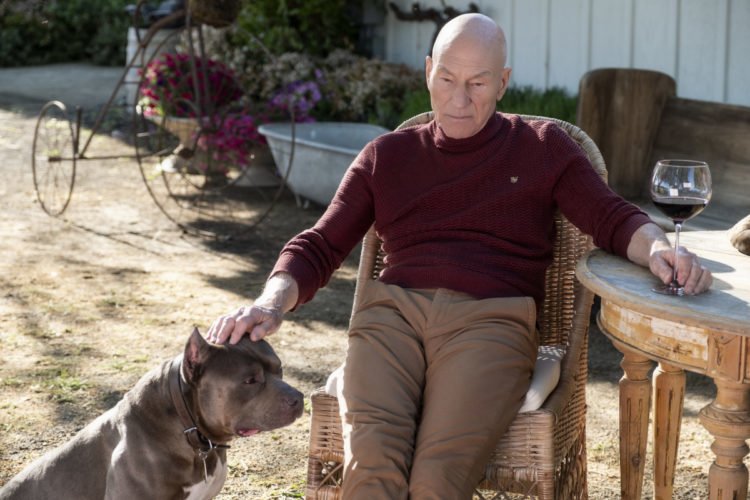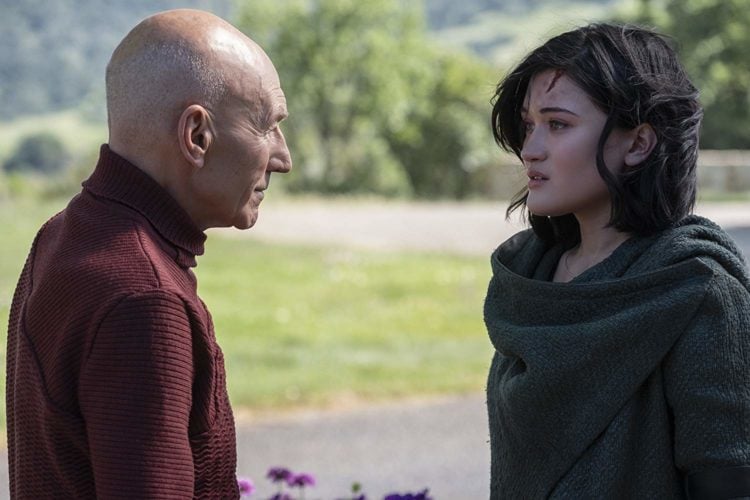
A retired Jean-Luc Picard must reconcile past mistakes while taking action to protect the legacy of a long-dead friend.
It’s been almost two decades since characters from Star Trek: The Next Generation were last onscreen to enthrall its fans who were an entire generation removed from the original series. In that time, we’ve had a trilogy of movies (divisive despite following the original series characters) and two seasons of Star Trek: Discovery to whet that Star Trek craving, where there remained a Next Generation-sized hole in the hearts of millions, one that Star Trek: Picard, if the premiere is any indication, is well on its way to filling.

Twenty years after the events of Star Trek: Nemesis and a decade after the supernova that destroyed the Romulan homeworld (detailed in 2009’s Star Trek reboot), Jean-Luc Picard has retired to his vineyard in France. There he lives his life with his trusty dog, Number One, and Laris (Orla Brady, American Horror Story, Into the Badlands) and Zhaban (Jamie McShane, Bloodlines, The Passage), Romulan refugees and friends to the once great captain and admiral.
Picard was instrumental in Starfleet’s efforts to relocate the Romulan populace prior to the supernova but, as seemingly no good deed goes unpunished, for reasons thus far unknown to us, a rogue group of synthetics used the focused effort to attack and destroy the Utopia Planitia shipyards on Mars, killing more than ninety-thousand people. This action drives Starfleet to not only ban all synthetics but to drop the relocation effort, effectively leaving millions of Romulans to die. During his first interview since walking away from Starfleet, Picard lays the foundations for why he left his beloved Federation.
In a brilliant performance in which Patrick Stewart reminds us of Jean-Luc Picard’s strength of character, he castigates Starfleet for abandoning the rescue efforts in an act that he deemed criminal. This is a short but effective delivery of exposition that gives us just enough information to see how Starfleet has changed (at least from Picard’s point of view) from a peaceful community of explorers ready to do the right thing to an organization more focused on reactionary self-interest.
“I haven’t been living. I’ve been waiting to die.”
Whereas the first act in “Remembrance” refamiliarizes us with Picard’s recent past, it’s not until the introduction of Dahj (Isa Briones, American Crime Story) that it ushers us behind the curtain to glimpse what is to be. Starting more like an espionage thriller like The Bourne Identity, Dahj and her boyfriend are attacked by mystery figures hell-bent on taking her down but when she’s “activated”, Dahj showcases an impressive display of martial skill that leaves her would-be abductors dead. But it’s her sharp emotions toward a face she knows but feels safe with—that of Picard—that drives her to find him.

Isa Briones is fabulous here, with an emotional vulnerability that can be felt through the screen. With the guidance of his dreams about Data (killed during the events of Nemesis) and research of his own storage possessions in the Starfleet Archives, Picard discovers that Dahj is none other than Data’s daughter. But that’s all we get because, soon after sharing the news with her, the pair are attacked by the same mystery figures that attacked Dahj earlier. And though she holds her own, the marauders destroy her, yet all is not lost.
Soon after Danj’s death, Picard visits the Daystrom institute where he meets Agnes Jurati (Alison Pill, American Horror Story, Goon) who suggests that, if the creation of a flesh-and-blood synth were possible, it would be done in pairs. This last bit is hammered home when the scene shifts from Picard’s decision to act to the Romulan Reclamation Site where meet Dahj’s twin, Dr. Soji Asha. Her interaction with a sketchy Romulan called Narek (Harry Treadaway, Mr. Mercedes, Penny Dreadful) hints at something sinister waiting in the shadows, though that is briefly forgotten when the camera pans out to reveal the Reclamation Site is built into a Borg Cube.
The pains a series premiere must go through to establish its world and characters is a difficult path to navigate and premieres that cross over from middling but with a promise to outright good are the exception. Trek fans can rejoice because “Remembrance” is one of those exceptions. Not only does it play to Trek fans’ nostalgia of a wonderful past but also a poignant and concise history lesson on Picard’s life since Nemesis. Combined with fast-paced action and fight choreography superior to most network-produced shows and special effects to match big-budget movies, Star Trek: Picard is an ingenious blend of the new and old, and a strong reintroduction into the future world of Star Trek: The Next Generation.
Make It So
- I can think of no better way for the series to begin than with a rendition of “Blue Skies” before transitioning to Picard and Data enjoying a game of poker (albeit in a dream sequence). Not only was it a callback to Nemesis and Data’s performance at Riker and Troi’s wedding but foreshadowed just how important even a posthumous Data is to the series. Though as much as I enjoyed Brent Spiner’s cameo, let’s hope they don’t use this trope too much as it would taint the lingering wound of Data’s sacrifice.
- It’s still very early on but the idea of banning synths for the horrendous attack on Mars seems like a treatment of the symptoms rather than the cause. It’s like seeing two pieces of a puzzle and assuming you know what the final picture looks like, the idea that these synths went rogue for the hell of it doesn’t feel right and from what little “Remembrance” gives us, seems like a deeper play was at work. This becomes especially likely considering Romulans were behind the attack on Picard and Dahj. Add in Narek’s motivations to the list of unanswered questions and it all points to a larger conspiracy beyond what’s been revealed.
‘Star Trek: Picard: Remembrance’ rating: 8 out of 10
